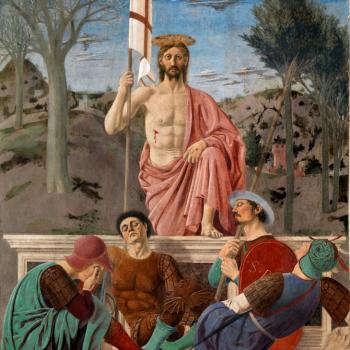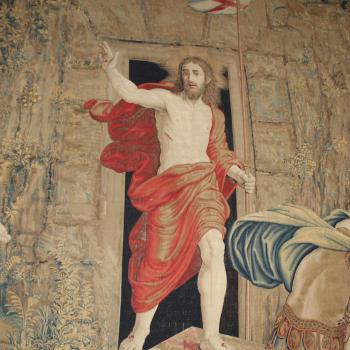The Adventurous Lectionary – October 19, 2014 – Pentecost 19
Exodus 33:12-23
Psalm 99
I Thessalonians 1:1-10
Matthew 22:15-22
“No one shall see me and live,” so God proclaims God to Moses. God reveals God’s glory to Moses, but it is more than mere mortals can handle, even those like Moses who “walk with God.” We can only see part of God, and dare not universalize our experience or limit God’s revelation to what we have experienced. God is always more than any person or institution can contain. We receive enough but never exhaust the divine nature in our moments of insight and revelation.
The encounter between God and Moses reveals the interplay of kataphatic and apophatic, in our experience of God. Moses experiences God passing by and is filled with awe and amazement. He can see God, but only partially. Moses only sees the “back side” of God and not the “face,” or full personality of the divine. The experience is overwhelming and life transforming.
Awesome wonder fills Moses and the Psalmist’s heart. God is here and God is more. We can exclaim with the lyricist, “how great thou art,” when we encounter the wonders of God’s world and saving love. We can name God, visualize God, taste and see God, and yet none of these can fully encompass the apophatic “dazzling darkness” of divinity.
Moses’ encounter with God reminds us that we cannot hold on to any images of God, even those which seem most adequate in describing our creator. Today’s First Testament passage might inspire a conversation about pluralism and perspective. The story is told about a number of sight-impaired persons and an elephant. Each person asserts that the body part of the elephant that he or she touches is the elephant in its entirety. But, there are many sides to an elephant and moreover a living elephant never stands still; the elephant is running and the sight impaired men are running for dear life just to keep up. Perhaps as they run, they touch different body parts and realize that no one part can fully describe the elephant’s reality. This is also characteristic of a living God; God is on the move, unconfined, and never tamed by our doctrinal orthodoxy or religious systems.
Paul’s letter to the Thessalonians emphasizes the power of the word and Spirit to transform our lives. Divine power is concrete, relational, and personal. It seeks good and not evil. We are never the same when we encounter the living word of God; the power of the cross and resurrection opens our spirits to God’s vision and gives us new powers. Still, despite their transformational power these experiences remain nevertheless finite and subject to future revision.
Jesus’ juxtaposition of our responsibilities to God and Caesar also center on the nature of power. Caesar’s power is coercive and temporal. It can dominate our lives, but it is only temporary. Caesar deserves appropriate respect in the political and governmental sphere. Yet, Caesar’s power is limited and part of God’s larger world. Our loyalty to Caesar is equally limited. Jesus is not suggesting a dualism of God and Caesar or positing two kingdoms, the sacred and secular. There is in reality only one kingdom, to which Caesar must ultimately account. Caesar’s realm exists within the movements of God’s providence. God does not necessarily support Caesar or any other political leader or system. In fact, all systems are equally finite, even the best of them. We can hope that our national loyalties mirror Lincoln’s comment that we need to pray that we are on God’s side, rather than God on our side. God blesses every nation, not just our own.
Jesus’ words connect with Moses’ experience. If God cannot be contained by human words or systems, then every human achievement needs to be seen for what it is – finite and relative. We owe obedience to our government, but this obedience is always conditioned by our greater obedience to God’s vision. Governments ask the “ultimate sacrifice” and often see themselves as worthy for our “ultimate concern.” While we may die in the service of our country, we must also be willing to measure our nation’s achievements by God’s standards. Our ultimate loyalty to God enables us to say “yes” and “no” to the requirements of any government, including ecclesiastical structures.
God is always more. The agnosticism of faith allows us to be on the move, always searching out God’s ways in the world and our lives. Out of the depth of God’s riches, we discover that our finitude is not a deficiency but the womb of possibility, inviting us to experience more than we can ask or imagine.
















